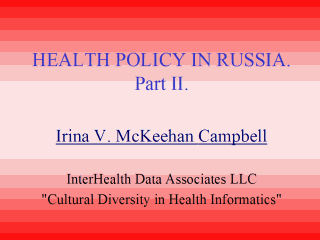 |
Did you see the Part I of
this lecture?PRE-PERESTROIKA HEALTH POLICY
Soviet health policy, prior to the
advent of Perestroika in 1985, enumerated broad program goals based on economic
exigencies. Lowering disease-specific mortality and morbidity rates were specified as
goals in the Soviet five-year health plans of the 1970s and 1980s. Other principal goals
included expansion of rural health services; expansion of preventive, genetic-counseling,
and maternal-child services; improvement of sanitation, quality of medical care and
education; increased availability, distribution, and production of pharmaceuticals and
medicinal supplies; organization of specialty diagnostic centers accessible to the rural
population at the republic and oblast levels. Soviet health policy research was dominated
by an economic model that related health status primarily to the needs of a centralized
economy (PRS 1982). |
